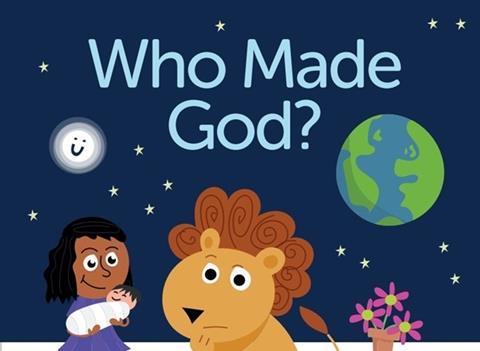Joanne Gilchrist equips Christian parents by tackling one of the most common questions children ask

This is the number one, most asked question by children, teens and even sometimes adults with the simplest answer: no one. But if the answer is so simple, then why do so many children keep on asking the question?
I once had an email from someone who said their grandson kept asking this question, so they bought my book “Who Made God?” but by the end of it, he wasn’t satisfied with the explanation. I thought I’d done a really good job of exploring the question and offering more than one way to unpack the answer for kids (and plenty of other people gave positive reviews) so it really got me thinking: is there deeper meaning behind the question, “Who created God?”
If the question was “Where can I buy a sandwich?” and the answer was to point at a shop and say “There” then you wouldn’t expect that person to keep asking around for where to buy a sandwich. Unless that’s not really what they’re asking.
“Who Created God?” is first and foremost a question about creation. In today’s Western world, the word ‘creation’ almost always has a religious connotation. Many non-believers will not even use the word ‘creation’ to describe the world in which we live. Yet the majority of children’s Christian resources begin with creation. So for some children, this may be a novel concept.
These are big ideas for little minds but instead of thinking “they’re too young to understand so I won’t bother right now” it’s good to plant the seeds when the ground is fertile and open
The creation account in Genesis is exhaustive; God created the earth, stars, seas, plants, trees, fish, birds, animals and humans; everything you can see, hear and touch, God created it all. So is it any wonder that the very next question to pop into their minds is ‘that just leaves God. If everything has been created and nothing is by chance or without design then doesn’t it make sense to include God in the list too?’ This question is articulated in the simple phrase “So …. who created God, then?”
They may be sincerely curious or they may be trying to trip you up, thinking they’ve found a gaping hole in your thinking.
So you panic. One minute you’re teaching the most basic of all Christian lessons and the next minute you’re presented with a fairly complex theological question. Please do not panic. It is a natural question to follow on from talking about creation. If everything is created, does that include God himself? Was God created too and if so, by whom?
I think it’s a bit jarring to a child to hear the quick, easy answer: ‘No one’. Not only does it shut down a conversation (which is the opposite of what we want), it seems to contradict the all-encompassing creation story they’ve been taught. So instead, try to embrace the opportunity to dig a bit deeper into the God of creation. Yes, God is creator and yet God is also more than that.
God is different
Even though we are made in the image and likeness of God, God is different to us. In some ways we are made to be like God - we can love, because God is love, we can do good things because God is good, we have thoughts, feelings and free will because God has thoughts, feelings and made us freely of his own will. And yet God is bigger, more powerful, more knowing than humans, God doesn’t change and God is everlasting.
While creation reflects the creator, they are not the same thing.
Talk about how most things have a beginning, middle and end but God is different. You can demonstrate with the life cycle of a flower (I like to use a dandelion) which avoids the topic of death - not that we shouldn’t talk about death with children but because sometimes kids love to talk about death and before you know it you’ve gone off-topic to chat about pets and grandparents etc. A great conversation but for another time.
Now, back to the point.
Psalm 103: 15-17a (NIrV) says:
“The life of human beings is like grass.
People grow like the flowers in the field.
When the wind blows on them, they are gone.
No one can tell that they had ever been there.
But the Lord’s love
for those who have respect for him
lasts for ever and ever.”
Human beings are one way, but God is another.
God is everlasting
It had to start somewhere. If someone made God, then you’d probably ask who made the person who made God. And then you’d ask who made the person who made the person who made God? And so on. There has to be someone who was first, who wasn’t created by someone else and yet had the power to create.
I am forever indebted to J John and his book “That’s a Good Question!”. He likens asking “Who Created God?” to an illustration coming to life and asking the artist “Who Drew You?” This is a genius way of demonstrating that maybe the reason we don’t like the answer is because we are asking the wrong question.
Read more:
Answering your child’s questions: What’s the point of praying? Because God is all powerful
Answering your child’s questions: What’s the point of praying? Because God is all knowing
Answering your child’s questions: What’s the point of praying? Because God doesn’t change
The persistent kid
There is another explanation. Sometimes we keep asking the question simply because we don’t like the answer. The person asking about the sandwich might keep asking because what they really want, but can’t articulate, is permission to skip the healthy lunch and binge on ice cream. So they’ll keep asking around till someone tells them what they want to hear, regardless of how helpful or true it is.
So perhaps someone simply doesn’t want to believe there’s a creator. So no matter how many times they hear the answer, what they really want to hear is “There is no creator. The universe came from nothing … or has always existed”. This ultimately is an ancient form of idolatry, replacing God with the universe, replacing the creator with creation.
For you, the parent
These are big ideas for little minds but instead of thinking “they’re too young to understand so I won’t bother right now” it’s good to plant the seeds when the ground is fertile and open. As the child grows, so will their understanding. After all, why would they bother to ask when they’re older and able to understand, if their questions were shut down when they were younger?
So keep going; embrace the question!


































